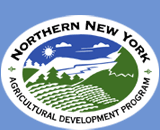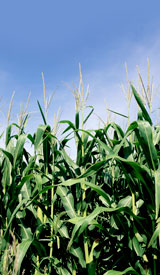September 24, 2009
Contact: See list at end of release
NNY Agricultural Research Evaluating Small Grains, Food-Grade
Soybeans, and Straw Production
Northern New York – The Northern New York Agricultural Development
Program (NNYADP) that funds on-farm research provides farmers with
region-specific agronomic data on crops that are well-suited to the
region. That data that supports the opportunity for adding farm income
with sales to regionally-based processors. The NNYADP, in collaboration
with Cornell University, is currently funding research that is
responding to farmer interests and market opportunities centered around
small grains, food-grade soybeans, and straw production.
Michael H. Davis manages the Cornell University E.V. Baker Agricultural
Research Farm in Willsboro, NY, and field trials at the WH Miner
Institute in Chazy, NY. Davis says, “High grain prices in recent years
have generated a surge of grower interest in producing small grains,
particularly wheat, for local and regional buyers.”
Northern New York has flour mills: Champlain Valley Milling in Westport
(Essex County) and North Country Farms LLC in Pamelia (Jefferson
County).
Davis manages small grain variety trials of spring and winter wheat,
triticale, spring barley and oats at the research farm in Willsboro, NY.
“Our current trials are evaluating the performance of established
varieties from area seed companies, such as JGL Seeds, Seedway and
Program, as well as advanced lines and recently released varieties bred
by Dr. Mark Sorrells at Cornell University,” Davis says.
Data collected for each variety includes heading date, plant height,
lodging (bending to the ground) score, yield, percent moisture, and
bushel weight.
Clean Straw Production under Evaluation
The research trials also include an evaluation of pre-cut straw
production. Davis says, “The premium prices paid for clean straw in the
Northeast have led to increasing interest in growing small grains solely
for the straw. Pre-cut straw production could prove to be a profitable
crop option for Northern New York farmers.”
Pre-cut straw is straw harvested after the crop has headed, but before
the grains have filled. Properly harvested pre-cut straw that has been
bleached to a yellow or off-white color before baling is generally
longer, cleaner and brighter than wheat straw baled after combining,
and, Davis says, as a result commands a higher price.
“The relatively tall winter triticale and rye varieties are particularly
promising as they have high straw yields and fewer lodging problems when
harvested before grain filling,” Davis says.
He adds that farmers have also shown significant interest in growing
spring grains, such as oats and barley, as pre-cut straw crops.
Organic Food-Grade Soybeans of Interest
Organic production of food-grade soybeans is also a focus of research
trials at the E.V. Baker Agricultural Research Farm.
“We are growing food-grade soybean varieties selected in consultation
with regional soybean processors and marketers and obtained from seed
companies in the U.S. and Canada. The trial plots are on the farm’s
certified organic acreage,” Davis says.
“Our objective is to identify varieties that perform well in organic
cropping systems and meet the quality demands of the marketplace.
Potential markets include regional grain dealers in New York, Vermont
and Canada, in addition to a food-grade soybean processor in Vermont.”
The Northern New York Agricultural Development Program is a
farmer-driven initiative to ensure the long term economic vitality of
Northern NY’s agricultural production sector and agriculture’s important
contributions to the protection and enhancement of the region’s
environment and rich natural resource base and to communities in New
York State’s six northernmost counties.
The Northern New York Agricultural Development Program awards grants for
practical on-farm research, outreach and technical assistance and is
supported by funds from the New York State Legislature through the long
term support of the North Country’s State Senators, and with the support
of NYS Assemblypersons from the region and other areas of the state.
Funding through the 2008-2009 New York State Budget and the support of
NYS Senator Elizabeth O’C. Little (45th Senate District) underpins
on-farm research at the Cornell E. V. Baker Research Farm at Willsboro,
W.H. Miner Agricultural Research Institute at Chazy, Cornell Uihlein
Maple Research Station in Lake Placid, and on operating farms in
Clinton, Essex and Franklin counties.
The program receives support (funds, time, land, expertise, etc.) from
Cornell University’s College of Agriculture and Life Sciences, the
Cornell University Agricultural Experiment Station, the NYS Agricultural
Experiment Station in Geneva, the six Northern New York Cornell
Cooperative Extension Associations, the W. H. Miner Agricultural
Research Institute, the U.S. Department of Agriculture, the New York
State Department of Agriculture and Markets, cooperating farms,
agribusinesses across the region, and others.
Learn more at www.nnyagdev.org.
# # #
Contacts:
Project leader: Michael H. Davis, Cornell E.V. Baker Agricultural
Research Farm at Willsboro, NY, 518- 963-7492
Cornell Cooperative Extension Crop Educators for Northern NY:
• Clinton County: Peter Hagar, 518-561-7450
• Essex County: Anita Deming, 518-962-4810
• Franklin County: Carl Tillinghast, Stephen Canner, 518-483-7403
• Jefferson County: Mike Hunter, 315-788-8450
• Lewis County: Joe Lawrence, 315-376-5270
• St. Lawrence County: Stephen Canner, 315-379-9192
Northern New York Agricultural Development Program:
www.nnyagdev.org
Co-Chairs Joe Giroux: 518-563-7523; Jon Greenwood: 315-386-3231



